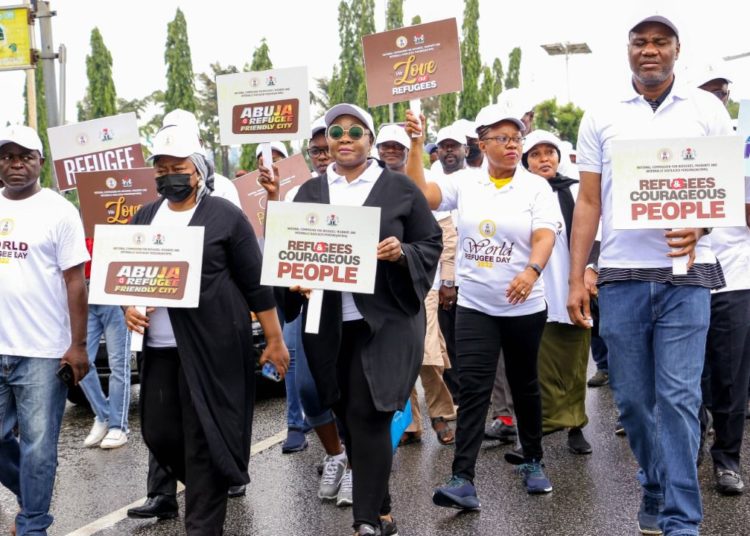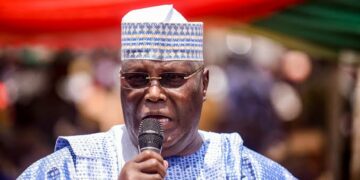The United Nations High Commission for Refugees (UNHCR) has said that Nigeria presently hosts 3.2 million displaced persons, including some 82,000 refugees , representing a 9 per cent increase from last year.
Deputy Representative of UNHCR, Mr John McKissick, explained that the refugees in Nigeria came from 34 different countries with 94 per cent of them being Camerounians.
He added that over 100 million people were forcibly displaced across the world.
This was disclosed on Friday in Abuja during a Road Walk carnival heralding the 2022 World Refugees Day with the theme, ‘Whoever, wherever, whenever, everyone has the right to seek safety.
World Refugee Day is an international day designated by the United Nations to honour refugees around the globe.
Speaking at the event, the Federal Commissioner, National Commission for Refugees, Migrants and Internally Displaced Persons (NCFRMI), Ms Imaan Sulaiman Ibrahim, applauded President Muhammadu Buhari and the Minister of Humanitarian Affairs and Disaster Management, Hajiya Sadiya Umar Farouq, for providing one of the best convivial environments for refugees to operate in.
She said that the federal government would continue to support persons of concern in the country, adding that the commission had undertaken the registration of refugees into the National Health Insurance Scheme (NHIS).
“Nigeria has done so well under the administration of President Muhammadu Buhari, and we will continue to do more.
“We will continue to give them assistance, support and protection. As far as I am concerned, they are victorious because people lost their lives in the process.”
She said the commission has also embarked on a massive training of registration protection staff to do more for refugees and persons of concern.
“The import of this year’s theme is that every person has the right to seek safety: whoever they are, wherever they come from, and whenever they are forced to flee. To live in dignity and safety and peace does not discriminate against race, skin colour, tribe, social status, placement or class. It recognises no hue of the blood colouration: whether blue or red! It is a fundamental human right.
“This year’s theme captures and points to the fact that people seeking asylum due to persecution, conflict or human rights abuse, are simply exercising their basic human rights to life and dignity, which should be respected, supported and upheld. To such vulnerable people, international borders should be open, without discrimination, to facilitate their flight to safety zones of choice.”
The Federal commissioner, NCFRMI stated that Nigeria developed and validated, at a High-Level Ministerial meeting in November, 2021, the implementation Roadmap for the Global Compact on Refugees (GCR) pledges, adding that Nigeria has implemented and continues to implement the pledges she made to the Global Compact on Refugees in 2019 through lofty policies and interventions.
“Many Ministries, Departments and Agencies have included in the National Medium Term Development Plan (MTNDP), 2021-2025, which the Federal Executive Council approved in December, 2021, programmes and projects that are in the interest of refugees and other Persons of Concern.
The event, which was well attended, had staff and management of NCFRMI, Non-Governmental Organisations, United Nations Refugees Agency (UNHCR), representatives of the refugees in Nigeria, and other developmental partners.
The NCFRMI Boss, Ms Imaan Sulaiman-Ibrahim said the NCFRMI in collaboration with the FMHADMSD and the UNHCR has commenced bilateral meetings with relevant implementing bodies, to enhance buy-in and implementation process of the GCR pledges.
“We have carried out GCR sensitization programmes in Cross River and Taraba States with a view to ensuring that States begin to effectively key into the implementation process.”
Meanwhile, Mr Cho Ernest, a refugee from Cameroun, speaking on behalf of other refugees, said that they had been in Nigeria for a long time and the commission had always been nice to them.
“We have been here in Nigeria and we have been able to feel at home, we have everything but we still need things just like Nigerians equally do.
“Each time we go to the office for anything, we are treated very well even if they are not solving that problem immediately. They
are always nice in the way they respond to us.
“We thank the Nigerian government for accepting us, especially the people we live with in the communities, because Nigerians are good people,’’ Ernest said.
June 20 is set aside yearly to celebrate the strength and courage of people who have been forced to flee their home country to escape conflict or persecution.
The deputy Representative of UNHCR, Mr John McKissick, noted that these refugees are generously hosted in 25 different states in Nigeria, able to access schools, primary health care facilities, vocational and other livelihood opportunities in the communities where they have settled.
McKissick explained that the agency sought to educate people on the fundamental right to seek safety and build a movement of solidarity for refugees across the globe.
He commended the Nigerian government and the Honourable Federal Commissioner and its people for the generous support rendered to the forcibly displaced persons.





